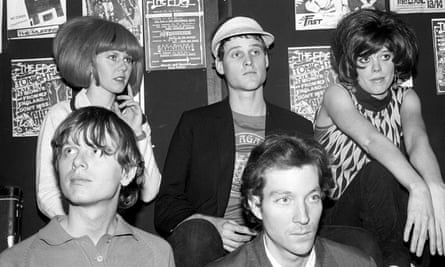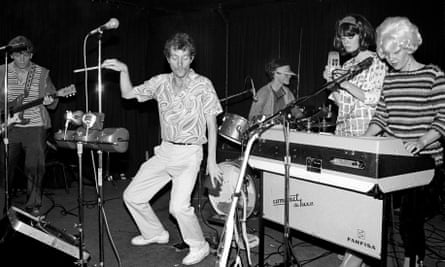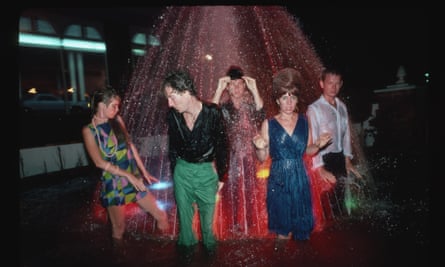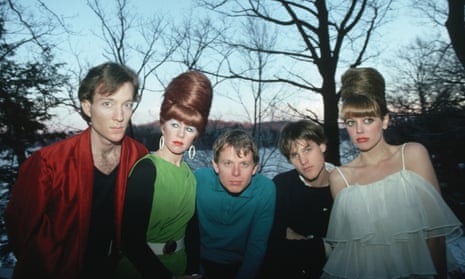Kathleen Hanna, Bikini Kill
What other band has three great lead singers? Nobody can do what Fred Schneider does. And Cindy [Wilson] and Kate [Pierson] – I remember listening to Give Me Back My Man, and the quality of their voices was so strong and so powerful. And also to be able to be so funny – their music is so joyous and interesting, and such a celebration of independent thinking.
Ricky [Wilson] passing of Aids was such a loss to the musical community that was never fully acknowledged. Ricky and Keith [Strickland] were the primary songwriters at the beginning, and just so obsessed with music. It’s really important to acknowledge [the influence of] gay men in music – the B-52’s are one of the biggest influences on every independent band that I’ve ever met. It’s not just all straight men who make music, it’s not all Bob Dylan – there are tons of different people who have made incredibly iconic, important music, who aren’t straight white guys, and I think it’s important to acknowledge that even though that’s not where their genius lies.
In Le Tigre, we opened two shows for the Pixies reunion in New York and the whole audience yelled “B-52’s” at us the whole time while we were performing, I guess because they assume all electronic music is the B-52’s. It was so funny, because they were booing us, but we were like: Oh my God, they think we sound like the B-52’s! We left the stage happy – that was really rude, but I mean, seriously, if you’re going to be booed, being called the B-52’s is like being booed with flowers.

Gerald Casale, Devo
The B-52’s and Talking Heads always felt like Devo’s kindred spirits. We were all unique and not very punk. The punks didn’t like us because we weren’t orthodox, and orthodoxy permeates rock’n’roll. We’d first become aware of the B-52’s through independent record stores when we were hawking our debut single. It was exciting because I knew where they were coming from, how they were grabbing from 1960s kitsch with the beehive hairdos and the theatricality of it all. It was like they’d come from their own planet. Who on earth sings about a Rock Lobster?
It was outsider stuff with a distinctive sound that was consciously slightly retro, coming from surf music and rockabilly, but not with rockabilly beats. They’d come up through the Athens, Georgia, scene and dance clubs and were in the realm of LGBTQ [music] before such a thing was identified. They were transgressive and polarising, but in a different way to Devo. I met Kate at the Mudd Club in New York in early 79 and immediately fell for her. She had the beehive, of course, because they were always in character, which I thought was fantastic.
David Byrne
We in Talking Heads became friends with the B-52’s early on. I remember they told us: “You have to see this other band from Athens playing at Danceteria – they’re called REM.” The Athens, Georgia bands were all very supportive of one another, it seemed to me.
I produced an album with the B-52’s which ended up as an EP [Mesopotamia]. I suspect they came to me because they wanted to experiment a little bit more. Maybe that’s why the LP got cut down to an EP – or maybe the other songs weren’t up to snuff? My favourite song from that record was Deep Sleep, which sounded like Young Marble Giants gone psychedelic. Ricky Wilson, who was such a large part of their sound, had Aids at that time, and was not around for many of the sessions. It was a pretty tough time for the band but they persevered and eventually revived. They were a tight family.
Jake Shears, Scissor Sisters
I was aged 12 when Love Shack came out [in 1989]. It was everywhere and was a game-changer for me. It was the first time I’d heard a gay man in music. Fred didn’t come out until 1992, but he didn’t need to. It was just the sound of an unabashed, unapologetically gay man at a time when it wasn’t part of the conversation. He was so interesting because he was more of an MC than a conventional singer. There wasn’t anything really sexual about the B-52’s but if you look at the lyrics to Dirty Back Road they’re obviously about butt fucking. There’s a silly sexuality to them. I just knew when I heard Fred for the first time that I had something in common with whatever I was hearing. I got the Cosmic Thing album and from that moment I was a huge fan. I’d find pictures and make collages, write letters to them and fantasise: “Maybe we could go out to lunch sometime?” I thought they were so cool, especially because it was otherwise such a lame time in pop music.
They were integral to me wanting to make music and showing me the possibilities of what a band could be and look like, free of convention. The B-52’s gave me the freedom to write stuff that was kind of stupid and dumb and funny just for the sake of being fun. What’s a Rock Lobster? You come up with something like that by free-styling and being open – basically using music as meditation. When I moved to New York aged 21 I went to their 25th anniversary show at Irving Plaza, which was unforgettable. Yoko Ono came out to sing Rock Lobster and I met Fred for the first time. Scissor Sisters went on to do a bunch of shows with them and I hope we continued the lineage. Without the B-52’s, Scissor Sisters wouldn’t have existed and I wouldn’t exist as a writer and performer.
Boy George
My friend Jeremy Healy had Rock Lobster, which we both loved. It was so random and surreal and I loved the idea that a song can be about anything. Rock Lobster is the Beach Boys on crack. I think Jeremy might have seen them live at the Lyceum but I couldn’t go. Then I bumped into Kate in Camden outside the Electric Ballroom when she was attending some other gig. I had a green face and said hello. I think she grimaced.
Later we [Culture Club] played with them a few times and they had the most unique, hypnotic sound. It’s trashy Americana, John Waters, Divine, the Shangri-La’s, high camp and bubblegum punk. The beat is everything. Fred always reminded me of Dr Zachary Smith from Lost in Space. I never thought about whether the B-52’s had a gay angle. They were just against rules in general – taking classic American kitsch and giving it a punk, space-age irreverence, like a beautiful car crash with pop surrealism. They were very camp but very funky: always on it, melodic but effortlessly free. It’s the sort of pop music that I want to hear.

Andy Bell, Erasure
I first became aware of the B-52’s in 1979. I liked the avant-garde, raw sound, the Sputnik Morse code intro of Planet Claire and the fact it was longer than the average single. They seemed to have something in common with Devo and Talking Heads – the US punk scene was a bit more arty than the UK punk scene, which I found too abrasive apart from Siouxsie and X-Ray Spex. I also loved their quirkiness, their psychedelic post rockabilly sound, off-the-wall 1950s fashion sense and surrealist sci-fi lyrics.
When I was in a pre-Erasure band called Dinger, we based our first single, Kettle of Fish, on Give Me Back My Man, which was one of my favourites alongside 52 Girls and Planet Claire. I’ve since toured with them a few times solo and with Erasure. I particularly enjoyed recording the [2020] Erasure album The Neon in Atlanta, Georgia, because I knew we were in B-52’s country.
Marcella Puppini, the Puppini Sisters
When Love Shack came out I was still living in Italy and it really touched me because it was just such a joyous, global thing. When we started the Puppini Sisters we drew on a lot of the same influences, certainly visually – kitsch, burlesque, 1950s glamour. Many years later we got to play with the B-52’s on [Cyndi Lauper’s] True Colors tour. We were put in the same dressing room and they were brilliant with us. It felt like our early days when we were doing all the clubs in Soho, backstage with drag queens, everybody sharing everything – a beautiful atmosphere. Andy Bell was there and everybody was so friendly. I was trying to calculate how old the B-52’s were because they looked amazing. One of the ladies – I’m not sure if it was Kate or Cindy – came over to us offering her body glitter. She said: “Just put some of this on and you’ll look fantastic on stage.” And we did.
Will Sergeant, Echo and the Bunnymen
I remember seeing the B-52’s at Eric’s in Liverpool. Rock Lobster had come out on some little label and they were on early doors, but they were great – so different. The guitar had that Duane Eddy twang with open tunings, Fred was doing all this talk-singing, they had these high-pitched harmonies and there was a wailing organ. They slotted in with the punk world but somehow weren’t like that at all. It felt quite art school. The nearest the UK had to a band like that were the Rezillos, but they were more punky. I got the first album and loved it. Like the Bunnymen, they started off in little clubs and the hits took them into the mainstream, but they never lost what had made them great in the first place: art school freaky rock’n’roll pop. They didn’t really change after they became successful: Love Shack has all the same ingredients as Rock Lobster, just a much bigger production. Other people just caught up with what they were doing.
after newsletter promotion
Lesley Woods, Au Pairs
The B-52’s are such were great fun. I love their image, I love the way the male voice is balanced with the female voices, which are extremely strong and very projected. They sound like an expression of joyfulness and they always make me want to sing along and dance. They’re the ultimate party band, the sort of band I’d love to be in. When we supported them in London we nicked one of their bottles of champagne, but I don’t think we deprived them too much. The B-52’s had a lot of champagne.
DJ Roger Sanchez
The first track that really turned me on to them was Rock Lobster. It was such a quirky, surf rock type of track, but different and very cool. Then in the 90s Love Shack became such a ubiquitous hit and interesting moment in pop culture. That’s when RuPaul started to become really visible because he was in the video. Fast forward 20 years, I was scrolling through my archives and came across an a cappella of Love Shack on a DJ promo. I was working on a track called 2Gether and realised the “and we can get together” vocal hook from Love Shack was just perfect for it. I put the vocal sample with some big tribal drums and this euphoric, rising strings line. It had this euphoric feeling and when I dropped it on the dance floor it went off. “And we can get together” is exactly what I was trying to project – a feeling of togetherness and unity. The B-52’s give you that. Their music is able to exist in all these different worlds.

Fee Waybill, the Tubes
Although the Tubes and the B-52’s have both been going for half a century each, we only played together for the first time last year, which is odd because we’re both very visual and quirky, so pretty well-matched. It was an honour to play with them. Their performances were spectacular. They run, dance and tell jokes. Everything is rehearsed to the tiniest detail and they spend hours doing the soundcheck, but you can see and hear the end product.
After we watched them they came to our dressing room with pizza and were such sweethearts. It’s obvious they really enjoy being in a band. They don’t take themselves too seriously – it’s weird and joyful and happy. I don’t understand why they’re stopping and we didn’t ask, but they still look in great shape and the crowds were going crazy. So I’m hoping this is farewell number one, and that after a short while they’ll come back and say: “OK, we changed our minds. This is farewell number two.”
Noodles, the Offspring
I heard Rock Lobster on the radio and got the debut LP. I was just getting into punk rock and although I didn’t really consider the B-52’s “punk”, they were definitely breaking rules and creating music that was unconventional and groundbreaking: while disco was being derided, here was a band who it was OK to dance along to. They were so different and cool. We all loved their first two albums and I’m sure they influenced us. We definitely learned that music doesn’t have to be taken so seriously.
We learned a lot by covering 52 Girls. I loved Ricky’s sound, and of course his guitar looked so cool on a record sleeve, with its missing strings. At the time most rock guitar heroes were so bombastic and over the top, so Ricky’s understated playing and fun approach was really novel. To this day I’m still trying to find just the right Mosrite guitar in honour of him and Johnny Ramone.
If I’m honest, the B-52’s got me to question my own prejudices. Where I was brought up there was a lot of anti-LGBTQ bigotry. When I was still a teenager, the B-52’s helped teach me to grow beyond them. For that alone I owe them a huge debt of gratitude. I was terribly saddened by Ricky’s passing and felt so sorry for the whole band.
It was an honour when someone on the internet mashed up Love Shack with our song Pretty Fly (For a White Guy). It’s an honour anytime we are ever mentioned in the same sentence as a band as legendary as the B-52’s.
Susanna Hoffs, the Bangles
The B-52’s were a big inspiration to the Bangles. To me they were like an art project. They took influences from the 60s – the Ventures or the [Johnny Rivers] Secret Agent Man riff – but didn’t follow any rules. The girls’ singing felt transforming and magical. Then of course when John Lennon said that they’d inspired him to return to music [which resulted in Double Fantasy] that mattered a lot to me too – a Beatle noticing this very cool band.
On our earliest releases before we signed to Columbia you can really hear their influence. There’s a surf instrumental called Bitchen’ Summer which I co-wrote with my childhood friend David Roback, who formed Mazzy Star. When the Bangles first played with the B-52’s, I was a little bit in awe and kind of tongue-tied, but they couldn’t have been more friendly. Fred came to see us in New York in 2016 or something and I was so thrilled to see that he had come to see us.
Terri Nunn, Berlin
I still remember seeing Fred, Cindy and Kate for the first time on Saturday Night Live when I was a teenager: Kate’s high-pitched opera sound opening Planet Claire, Fred talking, singing, prowling the stage, the beehive hairdos – what in the fuck is this?! I fell in love before the song was over. Nobody sounded like them. When Berlin got called to open for them, I think I died and went to heaven. Our tour together was the best time I ever had. It’s always a bigger risk to blaze a new trail musically, but if you do it and succeed, like the B-52’s have, you’re irreplaceable.

Comments (…)
Sign in or create your Guardian account to join the discussion